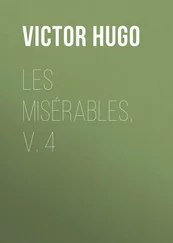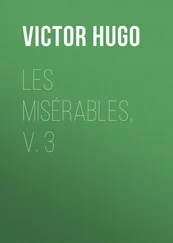"Towards the end, when he had reached the figs, there came a knock at the door. It was Mother Gerbaud, with her little one in her arms. My brother kissed the child on the brow, and borrowed fifteen sous which I had about me to give to Mother Gerbaud. The man was not paying much heed to anything then. He was no longer talking, and he seemed very much fatigued. After poor old Gerbaud had taken her departure, my brother said grace; then he turned to the man and said to him, `You must be in great need of your bed.' Madame Magloire cleared the table very promptly. I understood that we must retire, in order to allow this traveller to go to sleep, and we both went up stairs. Nevertheless, I sent Madame Magloire down a moment later, to carry to the man's bed a goat skin from the Black Forest, which was in my room. The nights are frigid, and that keeps one warm. It is a pity that this skin is old; all the hair is falling out. My brother bought it while he was in Germany, at Tottlingen, near the sources of the Danube, as well as the little ivory-handled knife which I use at table.
"Madame Magloire returned immediately. We said our prayers in the drawing-room, where we hang up the linen, and then we each retired to our own chambers, without saying a word to each other."
After bidding his sister good night, Monseigneur Bienvenu took one of the two silver candlesticks from the table, handed the other to his guest, and said to him,—
"Monsieur, I will conduct you to your room."
The man followed him.
As might have been observed from what has been said above, the house was so arranged that in order to pass into the oratory where the alcove was situated, or to get out of it, it was necessary to traverse the Bishop's bedroom.
At the moment when he was crossing this apartment, Madame Magloire was putting away the silverware in the cupboard near the head of the bed. This was her last care every evening before she went to bed.
The Bishop installed his guest in the alcove. A fresh white bed had been prepared there. The man set the candle down on a small table.
"Well," said the Bishop, "may you pass a good night. To-morrow morning, before you set out, you shall drink a cup of warm milk from our cows."
"Thanks, Monsieur l'Abbe," said the man.
Hardly had he pronounced these words full of peace, when all of a sudden, and without transition, he made a strange movement, which would have frozen the two sainted women with horror, had they witnessed it. Even at this day it is difficult for us to explain what inspired him at that moment. Did he intend to convey a warning or to throw out a menace? Was he simply obeying a sort of instinctive impulse which was obscure even to himself? He turned abruptly to the old man, folded his arms, and bending upon his host a savage gaze, he exclaimed in a hoarse voice:—
"Ah! really! You lodge me in your house, close to yourself like this?"
He broke off, and added with a laugh in which there lurked something monstrous:—
"Have you really reflected well? How do you know that I have not been an assassin?"
The Bishop replied:—
"That is the concern of the good God."
Then gravely, and moving his lips like one who is praying or talking to himself, he raised two fingers of his right hand and bestowed his benediction on the man, who did not bow, and without turning his head or looking behind him, he returned to his bedroom.
When the alcove was in use, a large serge curtain drawn from wall to wall concealed the altar. The Bishop knelt before this curtain as he passed and said a brief prayer. A moment later he was in his garden, walking, meditating, conteplating, his heart and soul wholly absorbed in those grand and mysterious things which God shows at night to the eyes which remain open.
As for the man, he was actually so fatigued that he did not even profit by the nice white sheets. Snuffing out his candle with his nostrils after the manner of convicts, he dropped, all dressed as he was, upon the bed, where he immediately fell into a profound sleep.
Midnight struck as the Bishop returned from his garden to his apartment.
A few minutes later all were asleep in the little house.
Towards the middle of the night Jean Valjean woke.
Jean Valjean came from a poor peasant family of Brie. He had not learned to read in his childhood. When he reached man's estate, be became a tree-pruner at Faverolles. His mother was named Jeanne Mathieu; his father was called Jean Valjean or Vlajean, probably a sobriquet, and a contraction of viola Jean, "here's Jean."
Jean Valjean was of that thoughtful but not gloomy disposition which constitutes the peculiarity of affectionate natures. On the whole, however, there was something decidedly sluggish and insignificant about Jean Valjean in appearance, at least. He had lost his father and mother at a very early age. His mother had died of a milk fever, which had not been properly attended to. His father, a tree-pruner, like himself, had been killed by a fall from a tree. All that remained to Jean Valjean was a sister older than himself,—a widow with seven children, boys and girls. This sister had brought up Jean Valjean, and so long as she had a husband she lodged and fed her young brother.
The husband died. The eldest of the seven children was eight years old. The youngest, one.
Jean Valjean had just attained his twenty-fifth year. He took the father's place, and, in his turn, supported the sister who had brought him up. This was done simply as a duty and even a little churlishly on the part of Jean Valjean. Thus his youth had been spent in rude and ill-paid toil. He had never known a "kind woman friend" in his native parts. He had not had the time to fall in love.
He returned at night weary, and ate his broth without uttering a word. His sister, mother Jeanne, often took the best part of his repast from his bowl while he was eating,—a bit of meat, a slice of bacon, the heart of the cabbage,—to give to one of her children. As he went on eating, with his head bent over the table and almost into his soup, his long hair falling about his bowl and concealing his eyes, he had the air of perceiving nothing and allowing it. There was at Faverolles, not far from the Valjean thatched cottage, on the other side of the lane, a farmer's wife named Marie-Claude; the Valjean children, habitually famished, sometimes went to borrow from Marie-Claude a pint of milk, in their mother's name, which they drank behind a hedge or in some alley corner, snatching the jug from each other so hastily that the little girls spilled it on their aprons and down their necks. If their mother had known of this marauding, she would have punished the delinquents severely. Jean Valjean gruffly and grumblingly paid Marie-Claude for the pint of milk behind their mother's back, and the children were not punished.
In pruning season he earned eighteen sous a day; then he hired out as a hay-maker, as laborer, as neat-herd on a farm, as a drudge. He did whatever he could. His sister worked also but what could she do with seven little children? It was a sad group enveloped in misery, which was being gradually annihilated. A very hard winter came. Jean had no work. The family had no bread. No bread literally. Seven children!
One Sunday evening, Maubert Isabeau, the baker on the Church Square at Faverolles, was preparing to go to bed, when he heard a violent blow on the grated front of his shop. He arrived in time to see an arm passed through a hole made by a blow from a fist, through the grating and the glass. The arm seized a loaf of bread and carried it off. Isabeau ran out in haste; the robber fled at the full speed of his legs. Isabeau ran after him and stopped him. The thief had flung away the loaf, but his arm was still bleeding. It was Jean Valjean.
Читать дальше












